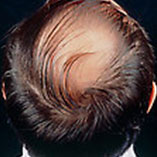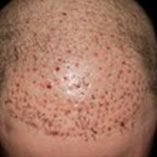Hair transplant Patient's Guide
How to choose the right doctor for you
If you are thinking at hair transplantation, then your hair is very important to you. It defines your features, it makes you look younger, it makes you feel more confident and ...more you. Your hair it's important! So, your hair transplant should be in the best medical hands you can afford. How can you determine that? Asking the right questions: you have to find out about doctors experience, credentials, best practices and you must feel confortable with your decisions.
- From where did the physician receive his/her M.D. degree and when?
- Is he/she licensed to practice medicine in the state in which the surgery will take place? Is the doctor a certified surgical specialist?
- How many hair restoration procedures has the doctor done - especially the specific type you are interested in?
- How easy it is to schedule a surgery? A busy practice it's an indication of a skilled and respected surgeon.
- The physician is willing to provide names of patients to be references?
- Are your questions responded calmly and satisfactory?
- At a first visit, the doctor spent sufficient time explaining the procedures and answering your questions?
- How many before/after photos of surgeries are been shown to you? Are you satisfied by the quality of those photos? Do you clearly see the changes? Are you satisfied by the aesthetic quality of the physician's work?
- What about the practice? Is there a clinic with a regular staff? Are there more practitioners, auxilliary medical personnel and office staff?
- Are you satisfied with the hygiene conditions and practices, it looks clean and neat?
- Are you satisfied with discussions about all treatment options and costs of each? Do you feel the doctor manifested absolute openness in this matter?
- Do you feel good in the presence of the medical and office staff?
BEFORE hair transplant surgery
During a preliminary consultation, the physician does a complete diagnostic analysis for the patient and both agree upon future proceedings. Each doctor may have his own aproach and may give specific pre-op instructions, which is best to be followed exactly. But, JUST for the purpose of a better understanding of what the general requirements might be before a hair transplant, the following Guide is a good resource:
Schedule the surgery so you can have a 7 days time off afterwards, needed for a proper healing, and in this period the transplant must be protected by any exterior stress or agression.
Several weeks in advance (2-3) confirm your appointment and make sure that your doctor has your lab tests. Make sure that he/she is informed about your medical problems, if you take any kind of medication, especially blood thinners and heart medication (beta-blockers). Make a list with your current medication, vitamins, energizants, supplements or any other substances you take (with or without prescription) and inform your doctor about it, so if anything is contraindicated you can discuss about it and decide what to do.
Ask if you need a longer haircut than usual, to cover the donor area afterwards.
For a week before surgery you must avoid using any medications which might lead in intraoperative hemorrhage and consequently resulting in low quality grafts. Excitants (alcohol, smoking, energisants, even some vitamins) can add to poor graft survival, so it is best to choose not to use them in the preliminary days - and even after surgery, also, for the continuing week.
Few days in advance, if you have white or light color hair, it can be useful to dye it a bit darker (light brown), so it can be better observed during the procedures. Do not dye it right before surgery, because the scalp needs to be color-free in the surgery day.
If you will leave the clinic in the same day of your surgery, arrange to have a responsible person drive you or assist you after the surgery, because you will not be fit to drive and you may feel a bit sleepy.
In the morning of the procedure a thorough head shampoo is necessary - just shampoo, do NOT use any styling products!
Do not use a hair piece or wig or any other hair system.
Have breakfast, but no coffee, black tea or other caffeinated beverages.
AFTER hair replacement surgery
The post-op development is influenced by carefuly following the instructions given by your doctor after surgery.
The first few nights sleep with your head elevated on pillows, in a semi-upright posture or using a neck pillow. If necessary, medication for sleep and pain is recommended.
At the base of each graft it will form a small scab, these scabs disappear in 4-14 days, nothing to worry about.
In the first week some soreness, tightness and possibly some numbness may apear in the donor area, and in the recipient area some swelling (forehead, or even face). This will receide normally after 7 days.
Shampooing can be resumed after 1-2-3 days from surgery (depending of your doctors instructions), very-very gently - NO touching, NO rubbing, NO scrubbing, best just pour a mix of water and shampoo, until the head is clean of any blood. In the first day of shampooing: wash like this 3 times per day. For the next 7 days, shampoo like this twice a day. Antibiotics may or may not be needed - follow your doctor advice, and a disinfectant lotion / shampoo may be prescribed to use during the first few days.
Avoid alcohol for a week after the hair replacement procedure and abstain from smoking for two weeks (to avoid circulatory problems).
Wear a hat if is to sunny, but NOT sunscreen (until at least 2 weeks after surgery).
Light exercise can be started in the first week, but avoid strong exercise for some weeks following hair restoration surgery, depending on your doctor instructions.
Avoid bathing, swimming, sauna, tanning for 2-3 weeks after the surgery.
The suture in the donor area will be completely healed after 7-10 days and the sutures (skin staples) can be removed - you will have an appointment at the clinic if this is the case. Some surgeons use absorbable stitches and these do not need to be removed .
Typically the grafted hair will shed in 2-4 weeks (do not worry, it's normal), but the root of these hairs remains intact and new hairs will grow from these roots between the second and the fifth month, at the normal rate of approximately 1/2 inch per month.
During the period in which the hairs will again begin to grow, some irritation of the skin may occur, which is caused by new hairs getting through the scalp. Also, the donor zone temporarily may becomes over-sensitive.
The final result can be assessed after 6 to 12 months.
Usually after 8-10 months the donor area has completelly recovered and, if another hair replacement procedure is needed , it can be considered.
Ask more!
Ask a medical representative a question about hair transplant:
Latest news
-

Transplant procedures can be somewhat painful mainly due to local anesthesia using injections into the scalp. But new procedures do not involve needles
-

Hair transplantation can be performed at any age, technicaly, but probably in many cases doctors recommend patients to wait up to an age close to 30 years.
-

-

Depending on the method used for harvesting grafts, recovery time can vary from a few days (FUE method) to 1-2 weeks (FUT or STRIP method)
-

Very important rules for a healty transition after hair transplant surgery.
-

What technique? FUE or STRIP? Advantages and disadvantages of each.
Latest forum posts
-


In the forums section you can receive informed answers (including from a medical representative) about hairtransplant issues, products or services of interest to you. Just ask!

